【精品】人教版八年级英语下册第三单元教案
- 格式:pdf
- 大小:88.00 KB
- 文档页数:14
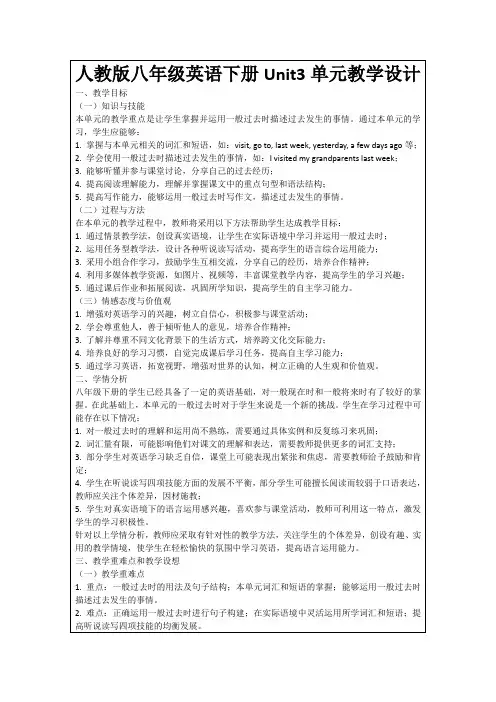
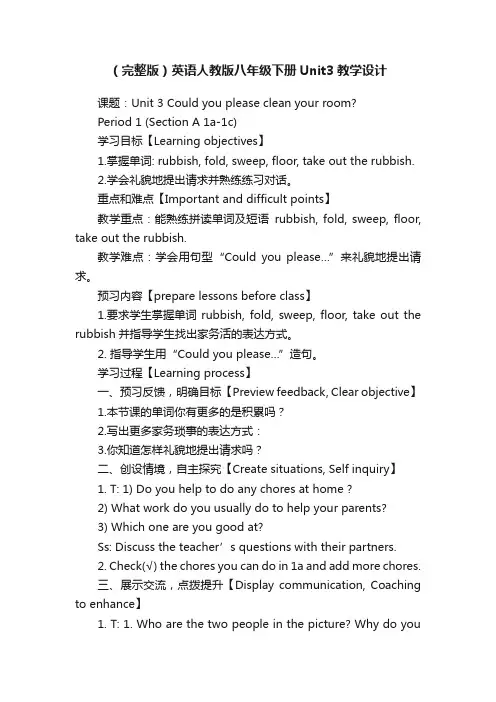
(完整版)英语人教版八年级下册Unit3教学设计课题:Unit 3 Could you please clean your room?Period 1 (Section A 1a-1c)学习目标【Learning objectives】1.掌握单词: rubbish, fold, sweep, floor, take out the rubbish.2.学会礼貌地提出请求并熟练练习对话。
重点和难点【Important and difficult points】教学重点:能熟练拼读单词及短语rubbish, fold, sweep, floor, take out the rubbish.教学难点:学会用句型“Could you please…”来礼貌地提出请求。
预习内容【prepare lessons before class】1.要求学生掌握单词rubbish, fold, sweep, floor, take out the rubbish并指导学生找出家务活的表达方式。
2. 指导学生用“Could you please…”造句。
学习过程【Learning process】一、预习反馈,明确目标【Preview feedback, Clear objective】1.本节课的单词你有更多的是积累吗?2.写出更多家务琐事的表达方式:3.你知道怎样礼貌地提出请求吗?二、创设情境,自主探究【Create situations, Self inquiry】1. T: 1) Do you help to do any chores at home ?2) What work do you usually do to help your parents?3) Which one are you good at?Ss: Discuss the teacher’s questions with their partners.2. Check(√) the chores you can do in 1a and add more chores.三、展示交流,点拨提升【Display communication, Coaching to enhance】1. T: 1. Who are the two people in the picture? Why do yousay so?2. Where are they? How do you know?2. Read the chores and add more chores.3. Use “Could you please…” to make a conversation just like Peter and his mother. 1c.4. Listen to 1b and check their answers.四、师生互动,拓展延伸【Teacher-student interaction, Development】【归纳】Make polite requests. ------ Could you please…? Yes, sure./ OK, but……【拓展】1.Can you do some dishes?2. rubbish的同义词:eg. You do talk rubbish sometimes. 胡言乱语【辨析】1. do 与make2. clean 与sweepeg. Let’s clean the house. You sweep the floor and I wash the dishes.五、达标测评, 巩固提高【Evaluation standards,Consolidation and improvement】基础题I. 根据句意及首字母提示写出单词。
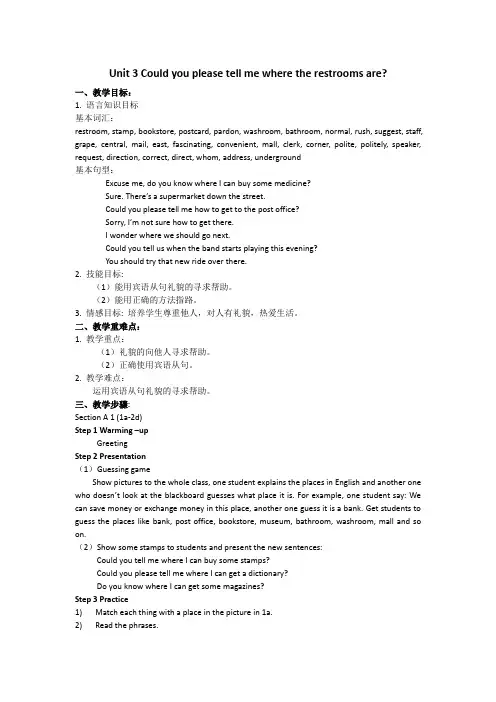
Unit 3 Could you please tell me where the restrooms are?一、教学目标:1. 语言知识目标基本词汇:restroom, stamp, bookstore, postcard, pardon, washroom, bathroom, normal, rush, suggest, staff, grape, central, mail, east, fascinating, convenient, mall, clerk, corner, polite, politely, speaker, request, direction, correct, direct, whom, address, underground基本句型:Excuse me, do you know where I can buy some medicine?Sure. There’s a supermarket down the street.Could you please tell me how to get to the post office?Sorry, I’m not sure how to get there.I wonder where we should go next.Could you tell us when the band starts playing this evening?You should try that new ride over there.2. 技能目标:(1)能用宾语从句礼貌的寻求帮助。
(2)能用正确的方法指路。
3. 情感目标: 培养学生尊重他人,对人有礼貌,热爱生活。
二、教学重难点:1. 教学重点:(1)礼貌的向他人寻求帮助。
(2)正确使用宾语从句。
2. 教学难点:运用宾语从句礼貌的寻求帮助。
三、教学步骤:Section A 1 (1a-2d)Step 1 Warming –upGreetingStep 2 Presentation(1)Guessing gameShow pictures to the whole class, one student explains the places in English and another one who doesn’t look at the blackboard guesses what place it is. For example, one student say: We can save money or exchange money in this place, another one guess it is a bank. Get students to guess the places like bank, post office, bookstore, museum, bathroom, washroom, mall and so on.(2)Show some stamps to students and present the new sentences:Could you tell me where I can buy some stamps?Could you please tell me where I can get a dictionary?Do you know where I can get some magazines?Step 3 Practice1) Match each thing with a place in the picture in 1a.2) Read the phrases.get some money get some magazineshave dinner get a dictionaryget some information about the town buy a newspaperbuy some stamps get a pair of shoesStep 4 ListeningListen and complete the conversations in the picture in 1a. Then check the answers with the whole class.Step 5 PracticeMake conversations using the information in 1a. Then talk about your own city. For example:A: Excuse me, could you please tell me how to get to the bookstore?B: Sure, just go along Main Street until you pass Center Street. The bookstore is on your right, beside the bank.A: Thanks. Do you know when the bookstore closes today?B: It closes at 7:00 p.m. today.A: Thank you!B: You’re welcome.Step 6 Listening1. Listen and number the directions in the order that you hear them.You will hear some of the directions below. Number the directions in the order you hear them.___Go to the bird floor.___ Turn left.___ Go to the second floor.___ Turn right.___ The supermarket is between the flower store and the bookstore.___ Go past the bookstore.2. Listen again. Show how the boy walks to the supermarket. Draw a line in the picture in 2a.Then get one student draw the line on the blackboard.3. Listen the third time and answer the questions.1) Excuse me, can you tell me where I can buy some medicine?2) Do you know how to go there?3) OK, great. Oh, and one more thing. Do you know when this shopping center closes tonight?4) OK, thanks a lot.Step 7 Pair workMake conversations about the other places in the picture in 2a.A: Excuse me. Can you tell me where I can buy some stamps?B: Yes, there’s a post office in this sho pping center.A: Do you know how to go there?B: Yes. Go to the third floor and turn right. Then go past the bank. The post office is between museum and library. You should be able to get stamps.A: OK, great. Oh, and one more thing. Do you know …B: I’m not sure, but you …A: OK, thanks a lot.B: You’re welcome.Step 8 Reading1. Read the conversation in 2d and answer the questions.2. Role – play the conversation.3. Explain the language pints in 2d.(1) Go along Main Street until you pass Center Street.1) until和till同义为“直到……”,till多用于口语,until可以放在句首,till则不能放在句首。
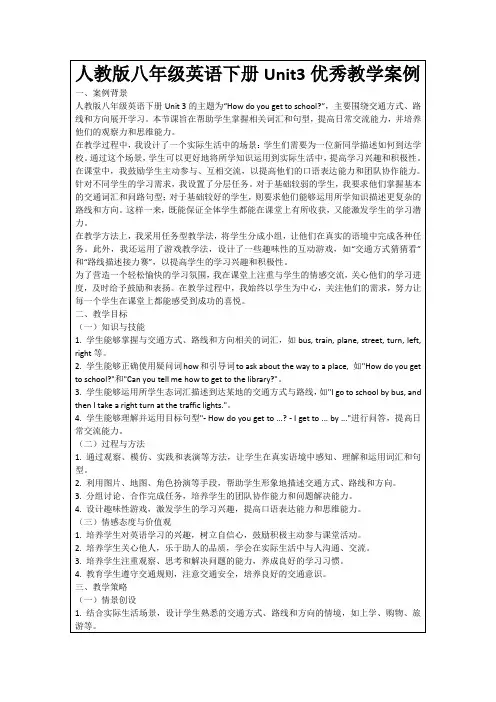
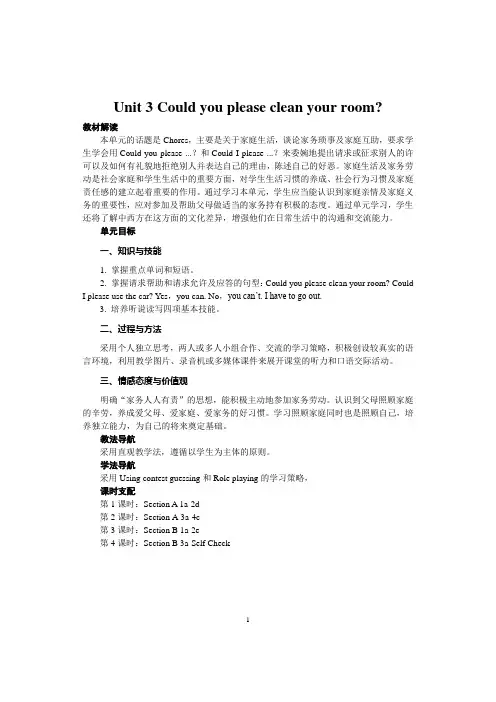
Unit 3 Could you please clean your room?教材解读本单元的话题是Chores,主要是关于家庭生活,谈论家务琐事及家庭互助,要求学生学会用Could you please ...?和Could I please ...?来委婉地提出请求或征求别人的许可以及如何有礼貌地拒绝别人并表达自己的理由,陈述自己的好恶。
家庭生活及家务劳动是社会家庭和学生生活中的重要方面,对学生生活习惯的养成、社会行为习惯及家庭责任感的建立起着重要的作用。
通过学习本单元,学生应当能认识到家庭亲情及家庭义务的重要性,应对参加及帮助父母做适当的家务持有积极的态度。
通过单元学习,学生还将了解中西方在这方面的文化差异,增强他们在日常生活中的沟通和交流能力。
单元目标一、知识与技能1. 掌握重点单词和短语。
2. 掌握请求帮助和请求允许及应答的句型:Could you please clean your room? CouldI please use the car? Yes,you can. No,you can’t. I have to go out.3. 培养听说读写四项基本技能。
二、过程与方法采用个人独立思考,两人或多人小组合作、交流的学习策略,积极创设较真实的语言环境,利用教学图片、录音机或多媒体课件来展开课堂的听力和口语交际活动。
三、情感态度与价值观明确“家务人人有责”的思想,能积极主动地参加家务劳动。
认识到父母照顾家庭的辛劳,养成爱父母、爱家庭、爱家务的好习惯。
学习照顾家庭同时也是照顾自己,培养独立能力,为自己的将来奠定基础。
教法导航采用直观教学法,遵循以学生为主体的原则。
学法导航采用Using contest guessing和Role playing的学习策略,课时支配第1课时:Section A 1a-2d第2课时:Section A 3a-4c第3课时:Section B 1a-2e第4课时:Section B 3a-Self Check1课时教案第1课时Section A 1a-2c教学目标一、知识与技能1. 掌握重点词汇和短语:do the dishes,take out the rubbish,fold your clothes,sweep the floor,make your bed,clean the living room2. 理解并掌握重点句型:Could you please…? Could I …?3. 能听懂有关做家务和日常活动的对话。
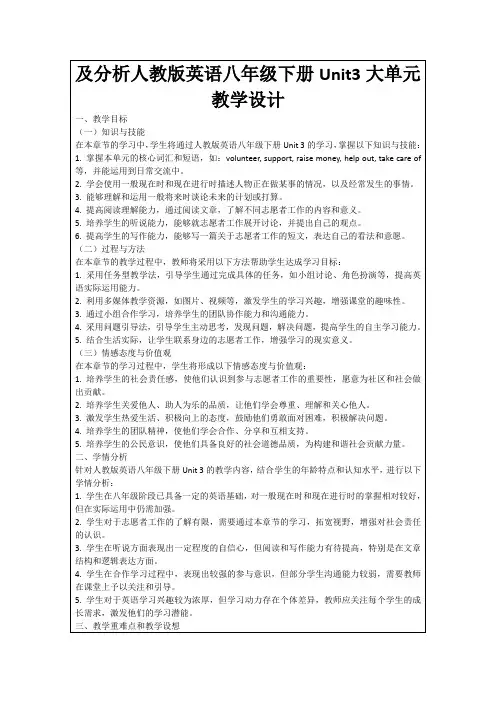

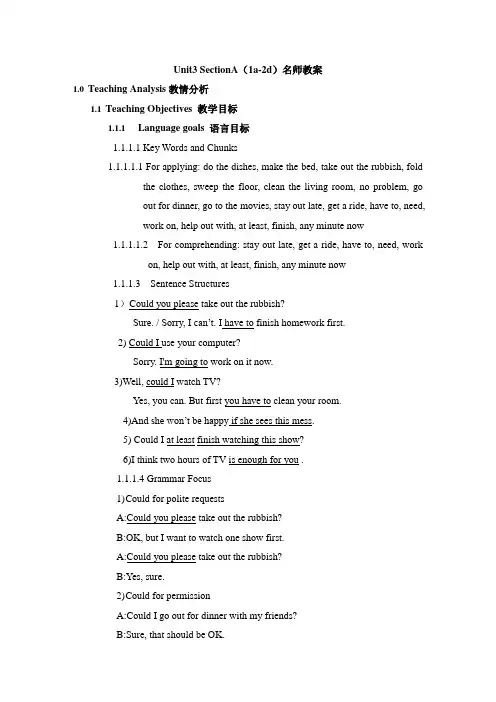
Unit3 SectionA(1a-2d)名师教案1.0Teaching Analysis教情分析1.1Teaching Objectives 教学目标1.1.1Language goals 语言目标1.1.1.1 Key Words and Chunks1.1.1.1.1 For applying: do the dishes, make the bed, take out the rubbish, foldthe clothes, sweep the floor, clean the living room, no problem, goout for dinner, go to the movies, stay out late, get a ride, have to, need,work on, help out with, at least, finish, any minute now1.1.1.1.2 For comprehending: stay out late, get a ride, have to, need, workon, help out with, at least, finish, any minute now1.1.1.3 Sentence Structures1)Could you please take out the rubbish?Sure. / Sorry, I can’t. I have to finish homework first.2) Could I use your computer?Sorry. I'm going to work on it now.3)Well, could I watch TV?Yes, you can. But first you have to clean your room.4)A nd she won’t be happy if she sees this mess.5) Could I at least finish watching this show?6)I think two hours of TV is enough for you .1.1.1.4Grammar Focus1)C ould for polite requestsA:Could you please take out the rubbish?B:OK, but I want to watch one show first.A:Could you please take out the rubbish?B:Yes, sure.2)C ould for permissionA:Could I go out for dinner with my friends?B:Sure, that should be OK.A:Could you get something to drink after the movie?B:No, you can’t. You have a basketball game to morrow.1.1.2Ability goals 能力目标1.1.2.1 教会学生用could礼貌地提出要求和征求许可。
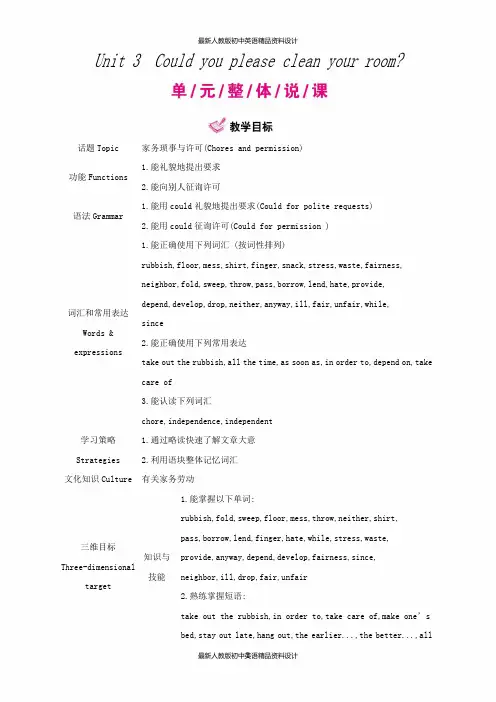
Unit 3 Could you please clean your room?话题Topic 家务琐事与许可(Chores and permission)功能Functions1.能礼貌地提出要求2.能向别人征询许可语法Grammar1.能用could礼貌地提出要求(Could for polite requests)2.能用could征询许可(Could for permission )词汇和常用表达Words & expressions 1.能正确使用下列词汇 (按词性排列)rubbish,floor,mess,shirt,finger,snack,stress,waste,fairness, neighbor,fold,sweep,throw,pass,borrow,lend,hate,provide,depend,develop,drop,neither,anyway,ill,fair,unfair,while,since2.能正确使用下列常用表达take out the rubbish,all the time,as soon as,in order to,depend on,take care of3.能认读下列词汇chore,independence,independent学习策略Strategies 1.通过略读快速了解文章大意2.利用语块整体记忆词汇文化知识Culture 有关家务劳动三维目标Three-dimensionaltarget 知识与技能1.能掌握以下单词:rubbish,fold,sweep,floor,mess,throw,neither,shirt,pass,borrow,lend,finger,hate,while,stress,waste,provide,anyway,depend,develop,fairness,since,neighbor,ill,drop,fair,unfair2.熟练掌握短语:take out the rubbish,in order to,take care of,make one’sbed,stay out late,hang out,the earlier...,thebetter...,allthe time,depend on,as soon as,do the dishes,get a ride,comeover,be angry with,in surprise3.能掌握以下句型:Could you please do sth.?I have to do some work.Could I do sth.?She won’t be happy if she sees this mess.For one week,she did not do any housework and neither did I.My mom came over as soon as I sat down in front of the TV.主语+hate+(to do/doing) sth.4.学会用could 礼貌地请求和征求许可。
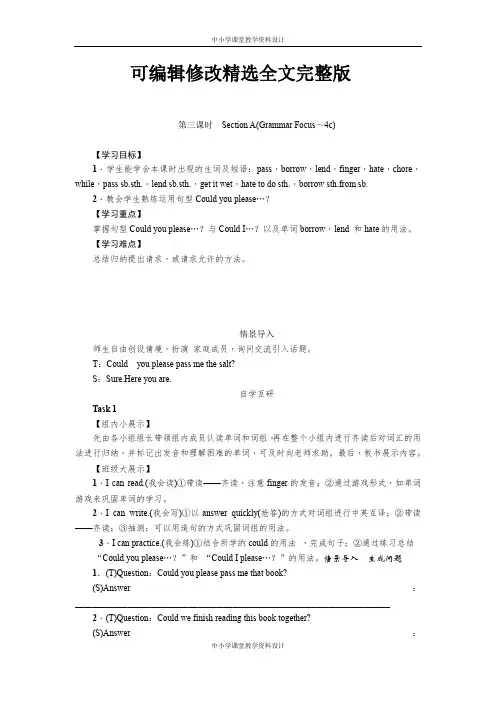
可编辑修改精选全文完整版第三课时Section A(Grammar Focus~4c)【学习目标】1.学生能学会本课时出现的生词及短语:pass,borrow,lend,finger,hate,chore,while,pass sb.sth.,lend sb.sth.,get it wet,hate to do sth.,borrow sth.from sb.2.教会学生熟练运用句型Could you please…?【学习重点】掌握句型Could you please…?与Could I…?以及单词borrow,lend 和hate的用法。
【学习难点】总结归纳提出请求,或请求允许的方法。
情景导入师生自由创设情境,扮演家庭成员,询问交流引入话题。
T:Could you please pass me the salt?S:Sure.Here you are.自学互研Task 1【组内小展示】先由各小组组长带领组内成员认读单词和词组,再在整个小组内进行齐读后对词汇的用法进行归纳,并标记出发音和理解困难的单词,可及时向老师求助。
最后,板书展示内容。
【班级大展示】1.I can read.(我会读)①带读——齐读,注意finger的发音;②通过游戏形式,如单词游戏来巩固单词的学习。
2.I can write.(我会写)①以answer quickly(抢答)的方式对词组进行中英互译;②带读——齐读;③抽测:可以用造句的方式巩固词组的用法。
3.I can practice.(我会练)①结合所学的could的用法,完成句子;②通过练习总结“Could you please…?”和“Could I please…?”的用法。
情景导入生成问题1.(T)Question:Could you please pass me that book?(S)Answer:________________________________________________________________________ 2.(T)Question:Could we finish reading this book together?(S)Answer:________________________________________________________________________自学互研生成能力Task 1Let's read the new words and phrases.1.I can read.(我会读)pass,borrow,lend,finger,hate,while,chore2.I can write.(我会写)(1)pass me the salt 递给我盐(2)come back too late 回来太晚(3)hate to do sth.讨厌做某事(4)finish reading 读完(5)hang out with my friends 与朋友闲逛(6)try(not)to do sth.尽量(不)做某事(7)get it wet 让它打湿(8)lend me some money借给我一些钱3.I can practice.(我会练)根据汉语意思完成下列句子,每空一词。
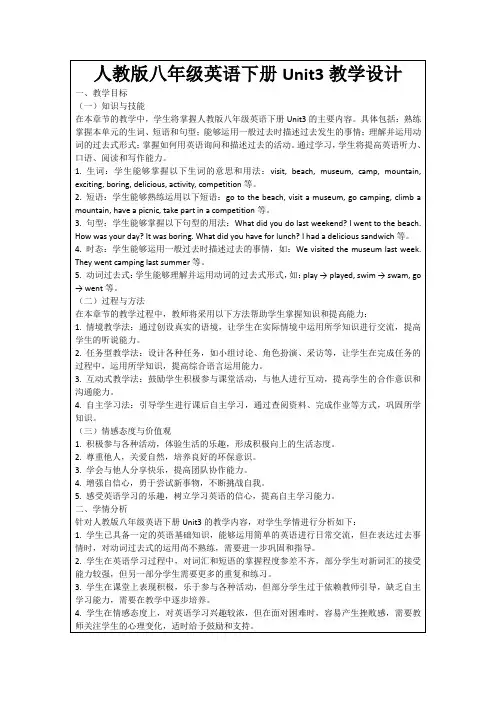
人教版八年级英语下册第三单元同步教学设计Unit 3Could you please clean your room?1.本单元话题以“家庭琐事与许可”展开,情境属于2022新课标“人与自我”主题范畴中的“做人与做事”这一主题群,涉及子主题“劳动实践,劳动品质与工匠精神”和“勤于动手,乐于实践,敢于创新”。
2.单元主题体现《中国学生发展核心素养》中的“社会参与”方面,提升学生的“实践创新”这一素养,立足于“劳动意识”这一基本要点。
3.能听懂有关做家务,与家人相处或者提建议的对话,并能利用情态动词could来礼貌地提出要求或者征询许可。
4.能读懂关于做家务、帮助他人的文章,并在生活中践行乐于助人的品质。
5.能够围绕“帮助他人”这一话题来进行写作,并维持良好的生活习惯。
6.培养学生家庭责任和义务的意识,增强主动做家务的自觉性。
续表【课时建议】本单元建议5课时Section A (1a-2d)(一课时)Section A (3a-3c)(一课时)Section A (Grammar Focus-4c)(一课时)Section B (1a-1e)(一课时)Section B (2a-Self Check)(一课时)词汇短语:主要采用图片及多媒体展示助记法。
基本句子:采用多媒体展示及交际法(利用多媒体展示两人进行交际时的情景)。
语法:通过对话练习让学生学习情态动词could的用法。
第一课时Section A (1a-2d)Step 1情景导入T:Do you often do housework at home?Take out the rubbish,make the bed or sweep the floor?Doing these things is an exercise and a good way of helping parents.And when talking to parents,it's important to be polite.“Could you please…?” and “Could I…?” are useful sentences to make requests and ask for permission politely.S:…设计意图:通过谈话的方式导入本单元重点句型,激发学生学习本单元的兴趣。
八年级英语下册第三单元集体备课教案(人教版)八年级英语下册第三单元集体备课教案(人教版)八年级英语下册第三单元集体教案(人教版)G fr it 8B Unit 3 uld u please lean ur r? Perid 1Setin A 1a-2教学设计Studing Ais(学习目标)1Be able t read the ne rds b ling at the prnuniatin(能根据音标拼读新单词)2Be able t use listening strategies t finish ff the listening tass(能运用捕捉主要信息等听力技能完成判断、选词任务)3Be able t ae a nversatin in pairs (能进行有礼貌请求和请求许可的对话)Preparing fr lass(候)As students t sit ell and he the rds ith eah therStuding predures (学习过程)Step 1: Dail greetings and leading int a ne lessn(导入新)Tda e’ll learn Unit3 uld u please lean ur r? In this unit e’ll tal abut hres and perissin (今天,我们将学习第三单元,本单元主要谈论家务琐事与许可。
)Step 2: Sh “Studing ais” (出示目标)(1’)Step 3: Guide ne(自学指导一)(4’)1Read and understand the rds b ling at the prnuniatin (根据音标拼读单词,1分钟后比比看,谁读得最好)(1’)2抽读、正音、领读、齐读(2’)3Finish 1a b riting dn A fr alas, U fr usuall, fr ften, S fr seties, HE fr hardl ever and N fr never (在短语旁边用频率副词的首字母写出自己做家务的频率)Step 4: Guide T (自学指导二)(3’)1Listen and he Peter’s ther r Peter ill d these hres听力策略:听前让学生预测可能听到的结果,诱发其好奇心和兴趣;听中,捕捉家务名称和说话人的语音语调;听后,用完整的句子说出答案,旨在练语言、用语言。
Unit 3 Could you please clean your room?第一课时Section A (1a2d)【学习目标】1.重点单词:rubbish,fold,sweep,floor,mess2.重点短语:take out the rubbish,fold your clothes,sweep the floor,make your bed,go out for dinner,get a ride3.重点句式:—Could you please sweep the floor?—Yes,sure.—Can I use you computer?—Sorry.I'm going to work on it now.Could you please help out with a few things?Could I at least finish watching this show?I think two hours of TV is enough for you!She won't be happy if she sees this mess.【学习重点】1.重点短语和句型2.熟练运用Could……?提出请求及其回答【学习难点】熟练运用Could……?提出请求及其回答【自主学习】一、预习课本P1718新单词并背诵,完成下面的汉译英。
1.垃圾____________ 2.折叠____________3.打扫____________ 4.地板____________5.杂物____________二、认真预习1a2d找出下列短语和句型。
1.倒垃圾2.叠你的衣服3.扫地4.整理你的床铺5.出去吃饭6.搭车7.—你能扫地吗?—好的,当然可以。
8.—我可以用你的电脑吗?—对不起,我想用它工作。
9.你能帮着做一些事情吗?10.我至少能看完这个节目吗?11.我认为对于你来说两个小时看电视就足够了。